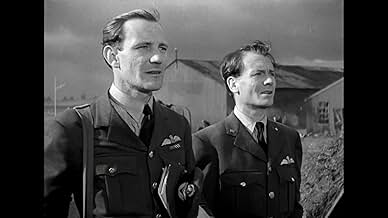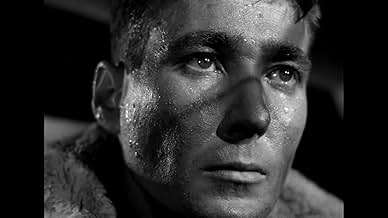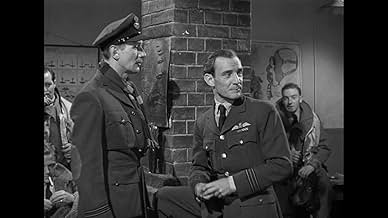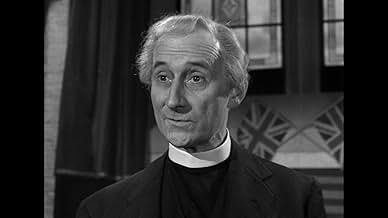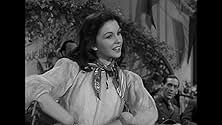AVALIAÇÃO DA IMDb
7,3/10
1,7 mil
SUA AVALIAÇÃO
Adicionar um enredo no seu idiomaThe wartime daily routine on a British bomber base in southeastern England is revealed through the eyes of newly arrived Flying Officer Peter Penrose (Sir John Mills).The wartime daily routine on a British bomber base in southeastern England is revealed through the eyes of newly arrived Flying Officer Peter Penrose (Sir John Mills).The wartime daily routine on a British bomber base in southeastern England is revealed through the eyes of newly arrived Flying Officer Peter Penrose (Sir John Mills).
- Direção
- Roteiristas
- Artistas
- Prêmios
- 1 indicação no total
Renée Asherson
- Iris Winterton
- (as Renee Asherson)
Bonar Colleano
- Joe Friselli
- (as Bonar Colleano Jnr)
Nicholas Stuart
- Col. Rogers
- (as Tryon Nichol)
Bill Owen
- 'Nobby' Clarke
- (as Bill Rowbotham)
Avaliações em destaque
I saw this film in Britain as a child when it first came out. The whole of our little town talked about it for days after it was shown in our single cinema. Of course, our population had been swollen by forces personnel, including airmen, so we were intimately familiar with the kind of events shown in the film. Now, learning from your web site the details of the distinguished writers, cast and production team, I understand better why it made such a deep impression. In brief, the film embodies the spirit of Britain as I remember it: firm resolve to defeat the Nazi evil, together with the consciousness of the tragedies and also the comic moments of World War II. This is something that is hard to imagine today, in Britain or elsewhere, and especially since the disillusionment produced by the Vietnam War. If only for this reason, the film is an invaluable testimony, truly portraying how British society was then. Other films from the 1940s are repeated constantly on TV; I have been waiting over fifty years to see this one again. Isn't it time for a video/DVD?
The great thing about this war flying film is that there's hardly any flying in it. It's all about the terrible toll war takes on normal people. What makes it so gripping to a modern audience is how the characteristic emotional restraint of people at that time is so faithfully portrayed. That's why it doesn't date. You just know that's how people really were back then.
Above all, it's the Rattigan screenplay, with its wonderful trilogical structure that speaks out.
If you want to see how people really felt and acted in England in WW2, in a beautiful, tragic film, then you must see it.
Above all, it's the Rattigan screenplay, with its wonderful trilogical structure that speaks out.
If you want to see how people really felt and acted in England in WW2, in a beautiful, tragic film, then you must see it.
The day i watched this film it was cold and damp outside, I settled in, turned up the heating, supplied myself with tea and cigarettes and was transported back to a black & white time in the 1940's when the world was fighting to keep Hitler at bay. The film is set on a RAF airfield, following the lives of several characters throughout the war. The filmmakers have done a great job in putting together an excellent cast, including the ever watchable John Mills,a young Bill Owen (Compo-only British people will know what I mean) Basil Radford and Michael Redgrave.The acting and screen writing is very natural and you are quickly sucked in to a way of life, of living, manners, morals, speech patterns, quiet heroism, that just doesn't exist anymore. There is no battles or bombings, all we see are the planes taking off and landing, but we don't need that, this film is about people and love and relationships, humour in the face of adversity, having to accept the death of your friends. There is good comedy relief in the shape the American air force guys who come to the base and the great Stanley Holloway. Check this film out it is excellent
The Way to the Stars begins on a downcast and flat footed note, a rather downbeat and dreary voice over as the camera sweeps its way through an old airfield long since abandoned. The voice is nostalgic, the tone full of regret and longing for the days of old. The camera nervously approaches the air field, as if afraid to go in, but does so and creeps around looking at markings on the wall; individual shelves and what-not that's still around. The year is 1945, and The Second World War is over; at least until the film triumphantly darts back to 1940 to a resounding chorus and tremendous score: hark, a plane in the RAF lands to a merry tune and all seems right again with activity and action clogging up the screen as busy bodies dart around and planes come and go. Despite this description, this is not a film that longs for conflict during times of war; rather the interaction and sense of togetherness it believes war brings out in people as they fight the cause. The opening tone in the aftermath of the mammoth event that was WWII suggests alienation, a sense of "where do we go from here?" Back in the day, The War was on; everyone knew their duty and would bond – we realise that the film doesn't miss The War itself, but rather the unity and relationships that formed out of The War as relics from days of old are ruefully lingered on.
In making The Way to the Stars, director Anthony Asquith has crafted a war film not entirely about the death and destruction of that time but the good that comes out of pulling together and forging certain relationships. Would young pilot Peter Penrose (Mills) have met young Iris (Asherson) had The War not been on?; would young American pilot John Hollis (Montgomery) have bonded with public house owner Miss Todd (John) had The War not been on? Would she be the same person after The War had she not gone through what she experienced with a certain flight lieutenant? Certainly not, in fact one moment much later on sees both Hollis and Todd share a moment in which they reflect on the implausibility of Americans visiting the exact setting they share under normal circumstances. But that's not to say it doesn't remember the war dead entirely, despite channelling (through Asherson's character) a sense of romping on with business; that despite loosing her husband of two years to The War, the film disallows her to grieve too heavily and instead places her on a path that sees her continue her role to play upstanding hostess and fuel the local pilots with escapism in the form of alcohol and unity, as well as later interaction with said American.
The film is a really well observed character piece; focusing on and manifesting a number of relationships in and around both a local airfield which houses Allied bombers and a public house named The Golden Lion. In 1940, all sorts of Royal Air Force members retain that fighting spirit and keep their chins up as German bombing threatens the air field and general area. The men are unperturbed, taking cover and keeping spirits high by nattering about menial things to distract themselves in that manner most films of the era had them positively presented. The presentation of masculinity, particularly in those between a young and middle age is mostly positive and upbeat with a young graduate has an opportunity to lie to a senior about some test scores but concedes to the truth another pilot is seen to help out in the kitchen of that local pub-come-hotel as he woos the owner with poetry.
Hounesty; resilience; an eye for the arts and always keen to lend a helping hand is the order of the day as these positive masculine traits are played out under a banner of strength through teamwork and ability to both connect and link with those of other cultures. For a film about men and male pilots; female character Miss Todd is impressively given a fair share of development; while young, initially snappy Penrose attempts to court a young woman named Iris are thwarted by her domineering aunt, a resident at the hotel, who'll have nothing of it if it means veering too far away from her. Penrose's arc will see him initially adopt one of the lead roles, something we were led into believing may have been Todd's husband, a certain David Archdale (Redgrave), who's in charge of the airmen before marrying and being granted a fairer share of screen time. Penrose is then is allowed to develop from a young hot-head into a calmer, more rueful and thoughtful young man more-so by way of the effects of the war on the home and those around him than any 'action' he saw overseas.
The film has a little more fun when the Americans arrive in '42, respectfully shifting tracts from loss of a friend and lover to a more comedic tone running on a clashing of cultures in detailing the differences in sports, beverages and sandwich fillings these two sides share. Their obvious initial ill-fitting to the locale exemplified in their upsetting of the 'old guard' in Iris' elderly aunt when she fails to connect with the young American pilots and their leisurely habits. That's not to say they're limited to alienated clowns though, as a certain Johnny Hollis will go on to take a rather predominant role; he himself alienated away from home and here rendering the piece not of a wholly begging ilk destined to highlight how solely bad the British had it. Through Hollis, the idea is that nationality is immaterial. In restricting his servants of The War to bombers and bombardiers, Asquith is reliant on how the effects of missions affect the life back home on the ground and in this sense, succeeds, culminating in a worthy effort that's worth seeing.
In making The Way to the Stars, director Anthony Asquith has crafted a war film not entirely about the death and destruction of that time but the good that comes out of pulling together and forging certain relationships. Would young pilot Peter Penrose (Mills) have met young Iris (Asherson) had The War not been on?; would young American pilot John Hollis (Montgomery) have bonded with public house owner Miss Todd (John) had The War not been on? Would she be the same person after The War had she not gone through what she experienced with a certain flight lieutenant? Certainly not, in fact one moment much later on sees both Hollis and Todd share a moment in which they reflect on the implausibility of Americans visiting the exact setting they share under normal circumstances. But that's not to say it doesn't remember the war dead entirely, despite channelling (through Asherson's character) a sense of romping on with business; that despite loosing her husband of two years to The War, the film disallows her to grieve too heavily and instead places her on a path that sees her continue her role to play upstanding hostess and fuel the local pilots with escapism in the form of alcohol and unity, as well as later interaction with said American.
The film is a really well observed character piece; focusing on and manifesting a number of relationships in and around both a local airfield which houses Allied bombers and a public house named The Golden Lion. In 1940, all sorts of Royal Air Force members retain that fighting spirit and keep their chins up as German bombing threatens the air field and general area. The men are unperturbed, taking cover and keeping spirits high by nattering about menial things to distract themselves in that manner most films of the era had them positively presented. The presentation of masculinity, particularly in those between a young and middle age is mostly positive and upbeat with a young graduate has an opportunity to lie to a senior about some test scores but concedes to the truth another pilot is seen to help out in the kitchen of that local pub-come-hotel as he woos the owner with poetry.
Hounesty; resilience; an eye for the arts and always keen to lend a helping hand is the order of the day as these positive masculine traits are played out under a banner of strength through teamwork and ability to both connect and link with those of other cultures. For a film about men and male pilots; female character Miss Todd is impressively given a fair share of development; while young, initially snappy Penrose attempts to court a young woman named Iris are thwarted by her domineering aunt, a resident at the hotel, who'll have nothing of it if it means veering too far away from her. Penrose's arc will see him initially adopt one of the lead roles, something we were led into believing may have been Todd's husband, a certain David Archdale (Redgrave), who's in charge of the airmen before marrying and being granted a fairer share of screen time. Penrose is then is allowed to develop from a young hot-head into a calmer, more rueful and thoughtful young man more-so by way of the effects of the war on the home and those around him than any 'action' he saw overseas.
The film has a little more fun when the Americans arrive in '42, respectfully shifting tracts from loss of a friend and lover to a more comedic tone running on a clashing of cultures in detailing the differences in sports, beverages and sandwich fillings these two sides share. Their obvious initial ill-fitting to the locale exemplified in their upsetting of the 'old guard' in Iris' elderly aunt when she fails to connect with the young American pilots and their leisurely habits. That's not to say they're limited to alienated clowns though, as a certain Johnny Hollis will go on to take a rather predominant role; he himself alienated away from home and here rendering the piece not of a wholly begging ilk destined to highlight how solely bad the British had it. Through Hollis, the idea is that nationality is immaterial. In restricting his servants of The War to bombers and bombardiers, Asquith is reliant on how the effects of missions affect the life back home on the ground and in this sense, succeeds, culminating in a worthy effort that's worth seeing.
This film was a tribute to the British and American bomber pilots who risked so much during WWII. While it is relatively simple in style, it was a lovely and effective film showing the human side of war. As the movie begins, it is just the British against the Germans in 1940 and a new pilot, John Mills, arrives at the airfield. Old hands, such as the Commander (Trevor Howard) and Michael Redgrave welcome the rookie and the climate is pretty grim. The film then jumps two years and it's 1942--American bomber crews are arriving and excited about getting into the action. A bit later, the film then jumps to 1944--as the war is nearing the end.
While this is a film about bomber crews, no shots of the crews on missions are used and most of the action takes place at a pub next to the base. Here, the crew members unwind and you learn about them as their characters slowly reveal themselves. What I particularly liked is that there were no bigger than life heroes here--just decent men who bravely did their jobs and tried to maintain their sanity through it all. Because of this, the performances were generally understated and realistic--like we are peering through a window into the past. Also, and I don't want to reveal any specifics, I liked how many of the main characters died through the course of the film--heightening both the realism and reminding us just how high the cost was for freedom.
Exceptional acting, writing and direction make this one of the better war films of the era and in many ways is like an aerial version of IN WHICH WE SERVE. Superb.
While this is a film about bomber crews, no shots of the crews on missions are used and most of the action takes place at a pub next to the base. Here, the crew members unwind and you learn about them as their characters slowly reveal themselves. What I particularly liked is that there were no bigger than life heroes here--just decent men who bravely did their jobs and tried to maintain their sanity through it all. Because of this, the performances were generally understated and realistic--like we are peering through a window into the past. Also, and I don't want to reveal any specifics, I liked how many of the main characters died through the course of the film--heightening both the realism and reminding us just how high the cost was for freedom.
Exceptional acting, writing and direction make this one of the better war films of the era and in many ways is like an aerial version of IN WHICH WE SERVE. Superb.
Você sabia?
- CuriosidadesThe poem "For Johnny" read by Sir John Mills is as follows: "Do not despair, For Johnny-head-in-air; He sleeps as sound, As Johnny underground. Fetch out no shroud, For Johnny-in-the-cloud; And keep your tears, For him in after years. Better by far, For Johnny-the-bright-star, To keep your head, And see his children fed."
- Erros de gravaçãoAs the American pilot alights to join the first US bombers leaving to bomb the Nazis on "Aug. 17" (1942) his Mae West is visibly stenciled: "Insp 5/3/44" .
- Citações
Squadron Leader Sil Carter: Well, chaps, as you know the target for this afternoon is exactly the same as yesterday's, and the day before yesterday's, and the day before that. Calais. Barge concentrations.
- Cenas durante ou pós-créditosThe end credits play over a night sky showing a crescent moon and many stars.
Principais escolhas
Faça login para avaliar e ver a lista de recomendações personalizadas
- How long is Johnny in the Clouds?Fornecido pela Alexa
Detalhes
- Data de lançamento
- País de origem
- Idioma
- Também conhecido como
- Johnny in the Clouds
- Locações de filme
- The Golden Lion Hotel, 114 High Street, Northallerton, North Yorkshire, Inglaterra, Reino Unido(exteriors of village pub)
- Empresa de produção
- Consulte mais créditos da empresa na IMDbPro
- Tempo de duração1 hora 49 minutos
- Cor
- Proporção
- 1.37 : 1
Contribua para esta página
Sugerir uma alteração ou adicionar conteúdo ausente

Principal brecha
By what name was Além das Nuvens (1945) officially released in India in English?
Responda
